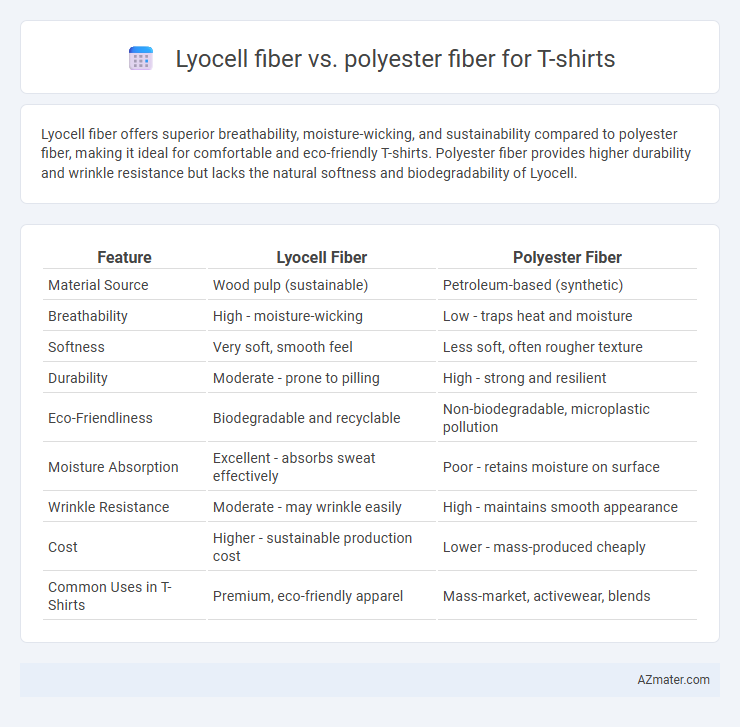Lyocell fiber offers superior breathability, moisture-wicking, and sustainability compared to polyester fiber, making it ideal for comfortable and eco-friendly T-shirts. Polyester fiber provides higher durability and wrinkle resistance but lacks the natural softness and biodegradability of Lyocell.
Table of Comparison
| Feature | Lyocell Fiber | Polyester Fiber |
|---|---|---|
| Material Source | Wood pulp (sustainable) | Petroleum-based (synthetic) |
| Breathability | High - moisture-wicking | Low - traps heat and moisture |
| Softness | Very soft, smooth feel | Less soft, often rougher texture |
| Durability | Moderate - prone to pilling | High - strong and resilient |
| Eco-Friendliness | Biodegradable and recyclable | Non-biodegradable, microplastic pollution |
| Moisture Absorption | Excellent - absorbs sweat effectively | Poor - retains moisture on surface |
| Wrinkle Resistance | Moderate - may wrinkle easily | High - maintains smooth appearance |
| Cost | Higher - sustainable production cost | Lower - mass-produced cheaply |
| Common Uses in T-Shirts | Premium, eco-friendly apparel | Mass-market, activewear, blends |
Introduction to Lyocell and Polyester Fibers
Lyocell fiber, derived from sustainably sourced wood pulp, offers exceptional breathability and moisture-wicking properties, making it ideal for T-shirts focusing on comfort and environmental friendliness. Polyester fiber, a synthetic material made from petrochemicals, provides durability, wrinkle resistance, and quick drying, commonly used in performance and athletic T-shirts. Choosing between Lyocell and Polyester depends on priorities like sustainability, softness, and ease of care in T-shirt fabric selection.
Overview of T-Shirt Fabric Requirements
T-shirt fabric requires breathability, moisture-wicking properties, and durability to ensure comfort and longevity during wear. Lyocell fiber excels in moisture absorption and biodegradability, offering a soft, breathable feel that reduces skin irritation. Polyester fiber provides superior strength, wrinkle resistance, and quick-drying capabilities, making it a popular choice for activewear but often less breathable than natural or semi-synthetic fibers like lyocell.
Production Process: Lyocell vs Polyester
Lyocell fiber is produced through an eco-friendly process where wood pulp is dissolved in a non-toxic solvent and spun into fibers using a closed-loop system that recycles water and chemicals, minimizing environmental impact. Polyester fiber originates from petrochemicals through a complex polymerization process involving ethylene glycol and terephthalic acid, which requires high energy input and generates greenhouse gases. The sustainable production of Lyocell contrasts with the energy-intensive manufacturing and carbon footprint associated with polyester, making Lyocell a greener alternative for T-shirt fabric.
Environmental Impact Comparison
Lyocell fiber, derived from sustainably sourced wood pulp using a closed-loop production process, has a significantly lower environmental impact compared to polyester fiber, which is petroleum-based and contributes to microplastic pollution during washing. Lyocell's biodegradability and reduced water and energy consumption during manufacturing make it a more eco-friendly option for T-shirts. Polyester's high carbon footprint and reliance on fossil fuels highlight the importance of choosing Lyocell for sustainable apparel production.
Comfort and Breathability in T-Shirts
Lyocell fiber offers superior moisture-wicking and breathability compared to polyester, enhancing comfort in T-shirts by keeping the skin dry and cool. The natural cellulosic structure of Lyocell allows better air circulation and softness, reducing irritation during prolonged wear. Polyester fabric, while durable and quick-drying, tends to trap heat and moisture, which can lead to discomfort and less breathability in high-activity or warm conditions.
Durability and Longevity
Lyocell fiber offers superior durability and longevity compared to polyester fiber due to its natural cellulose structure that resists wear and tear while maintaining breathability. Unlike polyester, which tends to degrade with repeated washing and exposure to heat, Lyocell maintains fabric integrity and softness over time. This makes Lyocell T-shirts a more sustainable and long-lasting choice for consumers seeking both comfort and resilience.
Moisture Wicking and Sweat Management
Lyocell fiber outperforms polyester fiber in moisture-wicking and sweat management due to its superior hydrophilic properties, enabling it to absorb and release moisture quickly, keeping the skin dry and comfortable during physical activities. In contrast, polyester fibers are hydrophobic, causing moisture to sit on the fabric surface, which can lead to a clammy feeling and slower drying times. Lyocell's breathable structure and natural fiber origin enhance sweat evaporation, making it an ideal choice for high-performance T-shirts focused on moisture regulation.
Color Retention and Dyeing Capabilities
Lyocell fiber demonstrates superior dye absorption and uniform color retention due to its cellulose-based structure, enabling vibrant and long-lasting T-shirt colors compared to polyester fiber. Polyester, a synthetic material, requires dispersive dyes and often shows less consistent color retention, with potential fading after repeated washes. The natural moisture-wicking and breathable properties of Lyocell also facilitate better dye penetration, enhancing color vibrancy on T-shirts over time.
Cost and Market Availability
Lyocell fiber, derived from sustainable wood pulp, typically costs 20-40% more than polyester fiber, which is petroleum-based and widely produced at scale. Polyester's extensive global manufacturing infrastructure ensures consistent market availability, making it the preferred choice for budget-friendly T-shirts. Lyocell's niche market presence and higher price point position it as a premium, eco-conscious alternative in textile production.
Choosing the Best Fiber for T-Shirts
Lyocell fiber offers superior breathability, moisture-wicking properties, and sustainability compared to polyester fiber, making it ideal for comfortable and eco-friendly T-shirts. Polyester fiber excels in durability, wrinkle resistance, and color retention, suited for activewear and long-lasting garments. Selecting the best fiber depends on prioritizing comfort and environmental impact (Lyocell) versus durability and performance (Polyester) in T-shirt use.

Infographic: Lyocell fiber vs Polyester fiber for T-shirt
 azmater.com
azmater.com